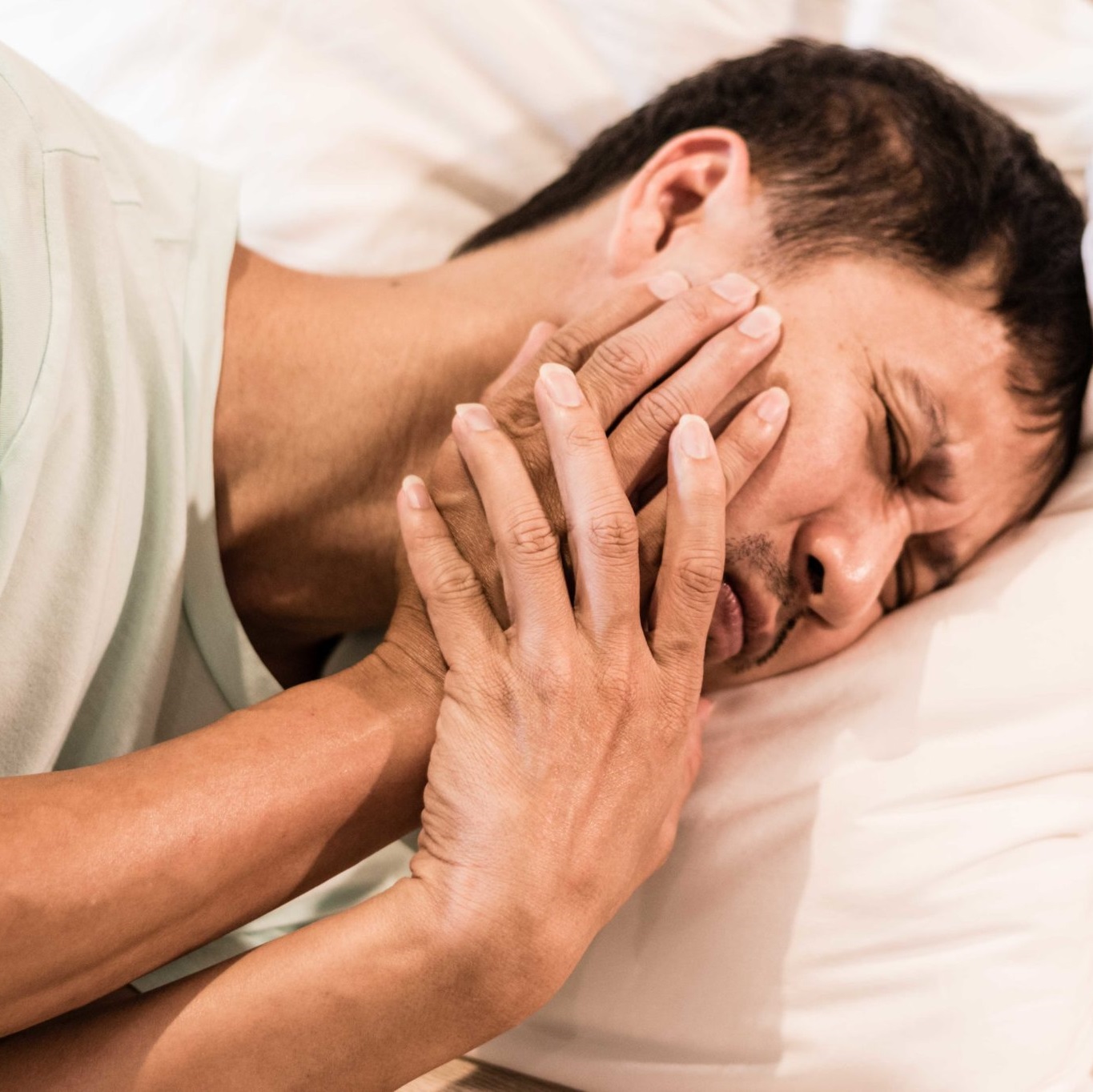What Does It Mean If You Grind Your Teeth at Night?

October 06, 2021
During the pandemic, dentists have seen an increase in the number of their patients who report teeth grinding and jaw clenching, according to a survey conducted by the American Dental Association Health Policy Institute. The increase is believed to be related to the rise in stress levels throughout the pandemic.
If you clench or grind your teeth at night, you may or may not know that you’re doing it. Often, a sleep partner first alerts someone that they’re grinding their teeth.
“Sometimes, people have the condition diagnosed by a doctor or dentist, because teeth grinding – which is called bruxism – can cause tooth damage, discomfort or other symptoms which may send them to the doctor or dentist,” says dentist Christian Madsen, DMD.
Symptoms of nighttime teeth grinding
Some people who grind their teeth at night may wake up with:
- Headaches
- Jaw pain
- Neck pain
- Sore or sensitive teeth
- Earaches
Over time, grinding your teeth at night may lead to problems, including:
- Tooth pain
- Tooth damage, including fractures, as teeth become worn down from the grinding
- Loosened teeth
- Gum soreness
- Temporomandibular joint (TMJ) disorders, which may cause jaw clicking, muscle pain and chewing difficulties
Who is at risk of nighttime teeth grinding?
Nighttime teeth grinding is a problem that runs in some families. It’s also more common in children than adults; many people who grind their teeth as kids or teens outgrow the habit over time. It’s less common as people age, with older adults doing it least frequently.
Adults who grind their teeth at night may be more likely to have certain health conditions, including:
- Sleep apnea
- Loud snoring
- Acid reflux
- Parkinson’s disease
- Huntington disease
Additionally, people may be more likely to grind their teeth at night if they:
- Smoke
- Drink caffeinated beverages
- Consume alcohol
- Take certain types of prescription antidepressants
- Use illegal drugs
- Have misaligned or crooked teeth
Treatments for nighttime teeth grinding
A dentist may diagnose and treat nighttime teeth grinding, based on physical wear that they notice on the teeth, complaints about unpleasant symptoms or a combination of the two.
When people clench their teeth during the daytime, they can go for physical therapy or learn relaxation strategies to gradually quit the habit. However, these strategies don’t work when teeth clenching or grinding happens while someone is sleeping, because the habit is unconscious. Fortunately, there are other ways to manage nighttime teeth grinding.
Possible solutions for nighttime teeth grinding include:
- Wearing a fitted mouth guard that prevents the teeth from rubbing together
- Taking prescription muscle relaxants for a short time frame
- Managing stressors in your life to reduce anxiety and stress
- Learning relaxation training or other strategies to lower overall stress levels
Next Steps & Resources:
- Meet our source: Christian Madsen, DMD, chair, Department of Dentistry, Jersey Shore University Medical Center.
- To make an appointment with Dr. Madsen or a doctor near you, call 800-822-8905 or visit our website.
The material provided through HealthU is intended to be used as general information only and should not replace the advice of your physician. Always consult your physician for individual care.
Find a doctor near me
When to Take Stomach Pain Seriously

Severe stomach pain? Learn when to seek medical attention from Dr. Nguyen at Bayshore Medical Center. Get expert advice on managing intestinal symptoms and potential conditions.
Should You Consider an At-Home Sleep Study?

At-home sleep study: Improve your sleep & health. Learn about sleep apnea testing & treatment options from experts. Call 800-822-8905.
Find a doctor near me

Can Wearables Help You Sleep Better?
Improve your sleep? Learn how wearables may help. Dr. Pristas shares insights. Get expert advice; call 800-822-8905.

Should You Drink Apple Cider Vinegar Before Bed?
Learn about apple cider vinegar from Drs. Rodriguez and Rudnitzky. Discover safe ways to use it and understand its limitations for weight loss. Call 800-822-8905 for an appointment.

How Losing Weight Can Add Years to Your Life
Bariatric surgery not only helps with weight -loss—it also can increase your life expectancy.
